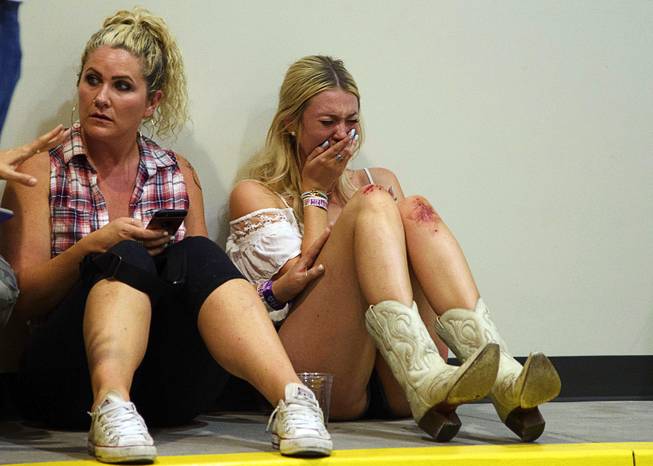
Al Powers / Invision / AP
A woman cries while hiding inside the Sands Corp. plane hangar after a mass shooting in which dozens were killed at the Route 91 Harvest Festival on Sunday, Oct. 1, 2017, in Las Vegas.
Thursday, Oct. 26, 2017 | 2 a.m.
How people are responding emotionally after the mass shooting on the Las Vegas Strip is the subject of a study by a UNLV psychology professor.
Stephen Benning developed the study a week after the Route 91 Harvest Festival massacre on Oct. 1, which left at least 58 people dead, hundreds wounded and more traumatized.
The study examines how people’s stories of the shooting are associated with symptoms of post-traumatic stress and depression. Their personality traits, growth from trauma and thoughts about the event will be explored.
“We think that the way people tell their stories may be related to the levels of post-traumatic stress and depression symptoms they exhibit,” Benning said.
Questions are designed for those who were at the festival and for local residents who were affected by the shooting.
Respondents will be asked about aspects of the immediate aftermath, such as whom they were with and what they were feeling. The study will also delve into how participants have coped in the event’s aftermath.
To see if the shooting has drawn those impacted by the event together, Benning created a question asking participants to describe how they’ve made efforts to share their stories with others who are similarly affected.
“One goal of the study is to give people a place to tell their stories and process what has happened,” he said.
Aside from recording their stories, the study features questions on whether participants are feeling any post-traumatic stress or depression symptoms; a description of their personality traits; and measures of psychological well-being.
Participants are required to be at least 18 years old and either to have been at the festival or be a member of the Las Vegas community who learned about what happened within 24 hours of the event.
“I’m proud to see our faculty members applying their research in the immediate service of our community in the wake of this tragic event,” said Diane Chase, UNLV executive vice president and provost.
The study features follow-ups one month, three months, six months and one year after the initial questionnaire. The study will examine how the responses vary from those at the concert, those who were first responders and those who weren't there but learned about it after the fact.
“The hope is that we can simply characterize the narratives of people’s experience in various ways, depending on what the outcome is from the stories,” Benning said. “We would be interested in looking at how those stories differed from each other and how they a similar. Because this is really a shared trauma for everyone on the Las Vegas Valley.”
Those interested in participating in the study can learn more here and must sign up by Oct. 31.

Join the Discussion:
Check this out for a full explanation of our conversion to the LiveFyre commenting system and instructions on how to sign up for an account.
Full comments policy